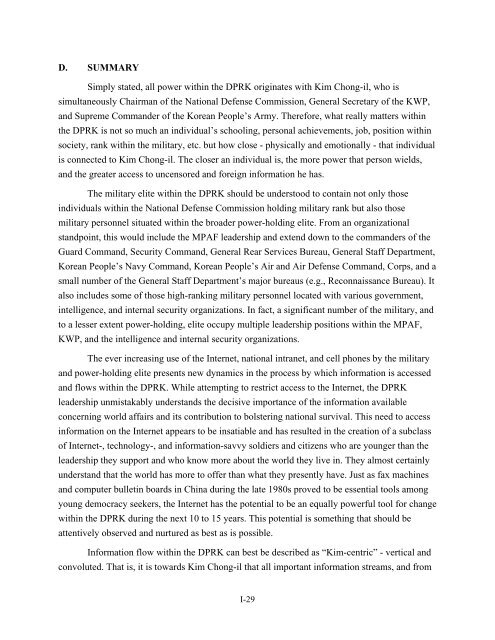North Korean Policy Elites - Defense Technical Information Center
North Korean Policy Elites - Defense Technical Information Center
North Korean Policy Elites - Defense Technical Information Center
You also want an ePaper? Increase the reach of your titles
YUMPU automatically turns print PDFs into web optimized ePapers that Google loves.
D. SUMMARY<br />
Simply stated, all power within the DPRK originates with Kim Chong-il, who is<br />
simultaneously Chairman of the National <strong>Defense</strong> Commission, General Secretary of the KWP,<br />
and Supreme Commander of the <strong>Korean</strong> People’s Army. Therefore, what really matters within<br />
the DPRK is not so much an individual’s schooling, personal achievements, job, position within<br />
society, rank within the military, etc. but how close - physically and emotionally - that individual<br />
is connected to Kim Chong-il. The closer an individual is, the more power that person wields,<br />
and the greater access to uncensored and foreign information he has.<br />
The military elite within the DPRK should be understood to contain not only those<br />
individuals within the National <strong>Defense</strong> Commission holding military rank but also those<br />
military personnel situated within the broader power-holding elite. From an organizational<br />
standpoint, this would include the MPAF leadership and extend down to the commanders of the<br />
Guard Command, Security Command, General Rear Services Bureau, General Staff Department,<br />
<strong>Korean</strong> People’s Navy Command, <strong>Korean</strong> People’s Air and Air <strong>Defense</strong> Command, Corps, and a<br />
small number of the General Staff Department’s major bureaus (e.g., Reconnaissance Bureau). It<br />
also includes some of those high-ranking military personnel located with various government,<br />
intelligence, and internal security organizations. In fact, a significant number of the military, and<br />
to a lesser extent power-holding, elite occupy multiple leadership positions within the MPAF,<br />
KWP, and the intelligence and internal security organizations.<br />
The ever increasing use of the Internet, national intranet, and cell phones by the military<br />
and power-holding elite presents new dynamics in the process by which information is accessed<br />
and flows within the DPRK. While attempting to restrict access to the Internet, the DPRK<br />
leadership unmistakably understands the decisive importance of the information available<br />
concerning world affairs and its contribution to bolstering national survival. This need to access<br />
information on the Internet appears to be insatiable and has resulted in the creation of a subclass<br />
of Internet-, technology-, and information-savvy soldiers and citizens who are younger than the<br />
leadership they support and who know more about the world they live in. They almost certainly<br />
understand that the world has more to offer than what they presently have. Just as fax machines<br />
and computer bulletin boards in China during the late 1980s proved to be essential tools among<br />
young democracy seekers, the Internet has the potential to be an equally powerful tool for change<br />
within the DPRK during the next 10 to 15 years. This potential is something that should be<br />
attentively observed and nurtured as best as is possible.<br />
<strong>Information</strong> flow within the DPRK can best be described as “Kim-centric” - vertical and<br />
convoluted. That is, it is towards Kim Chong-il that all important information streams, and from<br />
I-29













